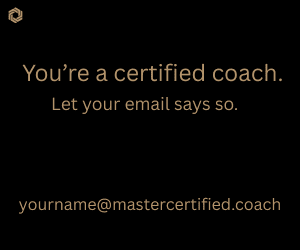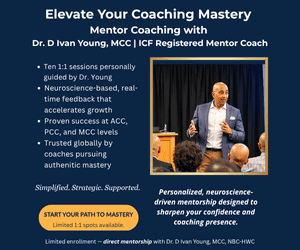It has been more than 20 years since Martin Seligman formally launched Positive Psychology (the science of human flourishing) in 1998 as a way to move away from the perception that psychology only focuses on disorder or negative facets of behavior. Positive Psychology moves the field toward more positive concepts of optimal human functioning, including topics such as well-being, happiness, life satisfaction, optimism, hope, flow, flourishing, mindfulness, positive relationships and more.
Since then, Positive Psychology has experienced exponential growth and momentum among coaches, practitioners, leaders and teachers. Positive Psychology is operationalized through Positive Psychology Interventions (PPIs), tools, assessments and resources, which have been used with coaching approaches (e.g., character strengths, PERMA, gratitude, best possible self exercises and more) as a means of helping clients, groups and teams flourish and thrive. The combination of Positive Psychology and coaching has been commonly referred to as “Positive Psychology Coaching (PPC),” as introduced by Robert Biswas-Diener in 2007.
Currently, there are diverse interpretations of the practice of PPC, ranging from applying positive psychology to coaching approaches, to overlaying coaching with PPIs that are based in science. However, PPC in its current form is missing another element in the equation: the formal inclusion of Coaching Psychology, which can be understood as the science, research and theories that underpin the application of coaching.
Coaching Psychology is also a robust field in its own right, having experienced significant growth since its formal launch in 2000 by Anthony Grant. This growth includes the creation of the Coaching Psychology Unit at the University of Sydney as a response to the frustration of many coaching practitioners about how to apply psychological theories in practice for well-functioning adults.
The application of Coaching Psychology is demonstrated through “evidence-based coaching”. Based on a 2017 international survey, some of the top evidence-based approaches used by practitioners include Cognitive Behavioral Coaching, Solution-focused Cognitive-Behavioral Coaching, Solution-Focused Coaching, Positive Psychology, and Neuro-Linguistic Programming.
Why Adopt an Integrated Approach to PPC?
The academic community, researchers and practitioners consider Positive Psychology and Coaching Psychology to be complementary fields because they both focus on well-being, growth and optimal human potential and functioning. As such, there have been calls for their integration within coaching (i.e., a new approach to positive psychology coaching). However, there is currently a lack of a coherent approach to developing such an integration, although there have been attempts to better articulate it to guide practitioners and researchers.
When the scientific fields of Positive Psychology and Coaching Psychology are integrated with the application of evidence-based coaching, there is tremendous potential to harness the best of both fields of Positive Psychology and Coaching Psychology to help practitioners bring together human flourishing and well-being in a holistic and powerful way.
Coaches, practitioners and leaders will then be able to make an even bigger impact on the well-being and prosperity of their clients, teams, organizations and in their own lives.
What are the Benefits of an Integrated Approach to PPC?
This new integrated approach is called “Applied Positive Psychology Coaching” (APPC), and it is the next wave in PPC that will further benefit the science of coaching, as well as help coaches develop further knowledge, skills and tools, experience personal growth and build a sustainable coaching practice.
Other key benefits of APPC include:
- Positive Psychology Coaching provides the field of coaching with additional interventions, assessments, techniques and methods that are empirically grounded. This means that coaches and practitioners can be confident that they are using strategies and techniques that are scientifically validated.
- There is further guidance to coaches, researchers, teachers and practitioners on the scope of APPC. The definition of APPC can be understood as the application of evidence-based coaching informed by the science and practice of positive psychology and coaching psychology, to enhance well-being, potential, strengths, performance and the achievement of goals (IPPC, 2021).
- APPC closes the knowledge and application gap between Positive Psychology and Coaching Psychology, and provides guidance on how to apply them effectively in an integrated way within coaching conversations.
- Both coaches and clients can experience a hybrid approach to well-being and optimal functioning. This is done by using various positive psychology research such as resilience, gratitude, forgiveness, etc. The research is then combined with various evidence-based coaching techniques such as cognitive behavioral coaching, solution-focused coaching, etc. to support the client’s psychological well-being.
Applied Positive Psychology Coaching is an emerging field, and as more and more coaches, practitioners and leaders understand its role in enhancing coaching practices and well-being, this integrated approach will prove to be – and is already proving to be – an integral part of the coaching field.
To learn more about Applied Positive Psychology Coaching, stay tuned for part two: the 3 Ways to Capitalize on the Next Wave in Positive Psychology Coaching.
© Meriflor Toneatto
Disclaimer
The views and opinions expressed in guest posts featured on this blog are those of the author and do not necessarily reflect the opinions and views of the International Coach Federation (ICF). The publication of a guest post on the ICF Blog does not equate to an ICF endorsement or guarantee of the products or services provided by the author.
Additionally, for the purpose of full disclosure and as a disclaimer of liability, this content was possibly generated using the assistance of an AI program. Its contents, either in whole or in part, have been reviewed and revised by a human. Nevertheless, the reader/user is responsible for verifying the information presented and should not rely upon this article or post as providing any specific professional advice or counsel. Its contents are provided “as is,” and ICF makes no representations or warranties as to its accuracy or completeness and to the fullest extent permitted by applicable law specifically disclaims any and all liability for any damages or injuries resulting from use of or reliance thereupon.
Authors
Post Type
Blog
Audience Type
Coach Educators, Experienced Coaches, External Coaches, HR & Organizational Leaders, ICF Assessors, ICF Chapter Leaders, Individuals Interested in Experiencing Coaching, Internal Coaches, Managers/Leaders Using Coaching Skills, Mentor Coaches, New Coaches, Professional Coaches, Team and Group Coaches
Topic
Future of Coaching, Research
Related Posts
Coaching as a Strategic Advantage: What the 2025 Global Coaching Study Reveals
The 2025 ICF Global Coaching Study highlights continued global growth in professional coaching alongside…
Walking the Talk: Reflective Practice for Coaches
Embodying presence and self-care through ICF Competency 2. This article explores how…
Why Transformational Coaching Will Always Be Human
As artificial intelligence (AI) gains power and popularity, many coaches are asking,…







